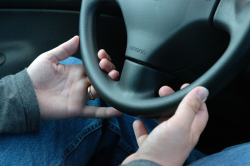
— A new study from the National Highway Traffic Safety Administration (NHTSA) estimates that electronic stability control (ESC) technology probably saved over 860 lives in 2010. The figure includes occupants of cars and light trucks/vans.
NHTSA said the estimate is an increase over the 705 lives saved in 2009 and 634 people who were saved by ESC in 2008.
ESC is a federally mandated system required in all new passenger cars, light trucks, SUVs, and vans built since 2011.
What is Electronic Stability Control?
ESC systems, also known as dynamic stability control, vehicle stability control and traction control systems, use computer controlled braking of each wheel to help the driver maintain control if the vehicle begins to lose stability at the rear wheels or starts to lose control at the front wheels.
It plays an important role in reducing single-vehicle crashes where a vehicle loses control and runs off the road. ESC can help to prevent the sideways skidding and loss of control that can lead to rollover accidents, especially in a one-vehicle crash.
It can help an SUV that makes an emergency turn to avoid an object in the road, but the technology won’t help with something like a fender-bender. It's designed to help a driver in the event of loss of control at high speed or when making a sharp turn on a wet road.
Insurance companies favor the technology because statistics show a 15 percent drop in losses under collision coverage for vehicles equipped with ESC.
An Increase in Vehicle Technology
You're surrounded by it, but how much do you really know about all the new technology in your vehicle? Check out any of the following.
- Vehicle Hands-Free Technology Gets Poor Grades
- Lane Departure Warning Systems Increase Insurance Claims
- Technology is no Replacement For Your Memory
- Technology Tries to Trump Common Sense
- Big Brother in Your Steering Wheel?
- Can Mandatory Rear-View Cameras Save Lives?
- Adaptive Headlights Show Promise
- Forward Collision Warning Systems Reduce Insurance Claims
- 75 Percent of Drivers Fear In-Vehicle Technology Too Distracting




